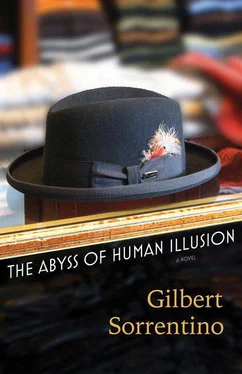For instance, let’s assume that Vince’s wife, had he a wife, never brought home from the store a particular brand of cereal that Vince liked, and that Vince often mentioned this. If, on his wife’s next shopping trip, she brought home the favored cereal, Vince would say, in irritation and contempt, tinged with sadness, that the only reason that she’d brought home the cereal was because he’d noted that she never brought it home. The cereal was diminished in value, likewise the act of buying it, because this act had not been his wife’s idea, but his.
So Vince rather sullenly lived his life, slowly and steadily being deprived by others of many — oh, many — things that he desired (and not only tangible things, but words, acts, even let’s say, emotions and “states of being”), since others simply stopped responding to his complaints of their neglect and blithe thoughtlessness. Why bother? may well have been their rationale. He never quite knew what ultimately hit him — and hit him and then hit him again. What he did know was that nobody, not a single person, honored his requests, his desires, his needs, before he was compelled to voice them, and when he did voice them they ignored him. They ignored him! It had not always been thus, but what it had been, indeed, was crass and crude, no better than the current situation, which revealed his friends, his imaginary wife, his colleagues at work, anyone who had the least acquaintance with him, to be shallow and selfish. How wonderful it was to be right.
In his old age, childless and thrice-divorced, with all of his old friends either dead, sick, or gone to sunbaked funereal places that were beyond his wish even to imagine them, Arthur began, one day, with no plan to speak of, to tote up, idly, to be sure, his grievances: the slights he’d endured, the insults, the petty humiliations unanswered and unavenged. He listed the unreciprocated kindnesses he’d shown others, the unanswered letters, the snubs, hurts, bad manners revealed, the advantage taken of him by those he had considered friends, or, at the least, not enemies. The project, if it may be given such a name, overwhelmed him, and he began to recover incidents, long forgotten, that he added, painstakingly and precisely, to his cruel catalog. He felt as if driven before a wholly unexpected avalanche.
He bought a notebook, rather, an accounting ledger, and meticulously divided it into twenty-six sections, given over alphabetically to those people he had, for the most part, fished out of oblivion. Now he could enter, with great care, all that these people had, he knew, he remembered, done to him. After each name — sometimes, when he had forgotten the name that went with the now-despised face, he would simply describe the person in a mnemonic shorthand — he wrote a carefully constructed synopsis of the sneer, the slight, the shabby act or remark that he attached to the person so recalled. Unsurprisingly, perhaps, Arthur pulled out of the pit of lost years, miseries long buried, and these would serve to illuminate others, many others, in their various darknesses. And, too, many of the wounds he felt once again were, to put it gently, imagined wounds. But they were added to his expanding lists.
His book, after a year or so, begot another, and then yet another, as his grievances grew and flowered, so that this accounting became his entire occupation. He was, if the word may be given a perverse reading, supremely content. A shabby euphoria, a Calvinist paradise.
He sat in a latticed-metal patio chair at a metal table so battered by time and weather that its stained, dirty-white enameled surface was pitted and gouged, thoroughly ravaged by large areas of rust. The sun was low in his eyes.
He was drinking canned 3.2 beer from a case that sat half under the table on the concrete floor; the beer was warm and metallic in his mouth and he’d drunk eighteen cans of it: he wasn’t, however, really drunk. Surely, he could stand up easily and walk into the beer hall from which a low-pitched roar of aimless anger and boredom and hilarity issued without cease. The other tables on this little concrete apron were mostly empty, but here and there other drunks sat drinking resignedly.
He could easily, easily walk into the beer hall but he didn’t care to, no. Above the low monotonous din there now floated a female singer’s voice, all blond and clean, remarking on the fact that she is lonesome and sorry and wondering if you are too, whoever you is. Then she stopped but the roar went on. He pulled open his fly buttons and slid himself forward on the chair, then pissed on the concrete between his feet, while he drank, stupidly, from a fresh can of beer. Maybe the drunks at the other tables would notice the pool of urine spreading on the concrete beyond his table, but they didn’t and they wouldn’t. They’re all pissing on the ground, too, he thought. He knew it. Nobody wanted to go to the latrines in the beer hall, for Christ’s sake.
Somebody — two somebodies — came out onto the concrete apron, headed for an empty table, each carrying a case of beer: one had Lone Star, the other Pearl. They were smoking and laughing, squinting into the late sun in their shining new fatigues. It was Rosie! One of them was Rosie! And the other was Koenig? Koenig! It was amazing, it was amazing, amazing. He put both hands on the table to push himself up on his feet and walk through the little pond of his urine, Rosie would see how dumb and funny that was, he’d walk over and say hello to them, Rosie and Koenig. Sit down and remember that chickenshit motherfucker platoon sergeant who got killed, thank God, just like they got killed. But now they were back, back here in the grim Texas sunlight, back and alive among the drunken living. They didn’t die after all? Only that cracker prick of a sergeant got it, checked the fuck out. Good. He got ready to get up, he could do it, easy.
More stories than we care to acknowledge are poignant yet wholly banal, and perhaps those that we insist on as poignant are not that at all, but are, rather, bathetic, sentimental, saccharine, or, even more dreadful, creakingly “worldly.” Perhaps this one fits the mold, if it can be called a story.
There were two friends, young men, filled with idealism, and the love, just burgeoning, for art and the artist’s life. We know them well. One becomes a high school English teacher, the other moves to Los Angeles and begins work at a talent agency in Beverly Hills, in, of course, the mailroom. After a few years he opens his own agency, and ten years later, is successful and rich, a millionaire “many times over.”
The friends’ correspondence, once brisk and regular, slowly peters out into a letter now and again, strained and brief, and finally settles into the official “holiday greetings and how is Susan” cards. The teacher is sure — and in this he is correct— that his millionaire friend stopped writing first because he has passed beyond their youthful friendship and become “too good” for him, although he does not think this prim and vaguely parental phrase. Here he is, in Queens, while “the famous agent”—and he does think this —shops on Rodeo Drive and has dinner with movie stars.
But the reason that the Los Angeles friend stopped writing is more subtle than this, more convoluted, perhaps. He broke off the correspondence because of his muddled belief that his old friend has long held him in contempt for his success, and for how that success was achieved; that he had somehow sold out his talents, his artistic soul, etc., etc. But this is not true, the teacher has always been pleased for if envious of his friend, and has, very unlike him, known, ever since they were just past their post-adolescence, that neither of them were artists, nor had any talent for art of any kind, and that his friend did not know this. He often recalls a letter that he received soon after his friend went to work for the agency, the gist of which was that it would be a great place to gather material for his novel, which he had finally seriously started. It was, of course, never ended.
Читать дальше












